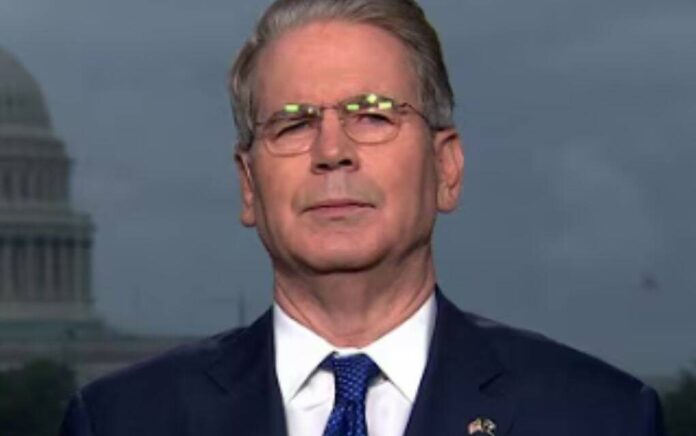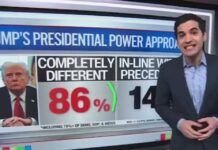
The Trump admin doesn’t care what the critics are saying. That could backfire.
But Trump’s advisers have just given him a wild update about what his policies are doing to America.
Trump Advisers Highlight Surge in Business Investment as Economic Boost
Advisers to President Donald Trump are pointing to a sharp rise in U.S. business investment as evidence of a potential economic surge, countering earlier concerns from economists about persistent inflation from previous policies. Treasury Secretary Scott Bessent recently highlighted Federal Reserve data showing a notable increase in industrial production of business equipment. On Tuesday, he suggested this uptick reflects businesses ramping up capital spending after a period of caution.
“Thanks to @POTUS’s pro-growth, America First agenda, we’re seeing a CapEx Comeback,” Bessent wrote, noting that business equipment production surged 11% annualized in the second quarter, following a 23% increase in the first quarter.
Bessent described this as “the strongest back-to-back growth since 1997,” emphasizing that capital expenditures rose 16.6% in the first half of 2025, indicating a significant investment trend.
“The One Big Beautiful Bill jumpstarted investment that’s lifting productivity, wages, and living standards,” he added. “Blue collar paychecks are rising fast — second only to @realDonaldTrump’s first term — and the best is yet to come.” This positive outlook is gaining traction in Congress.
“People get excited about investing,” said Rep. Jimmy Patronis, R-Fla., who previously served as Florida’s Chief Financial Officer. “They get excited about predictability of where their money is going to go and what type of return they can get.
“And all that people ask for is just predictability in their investments. I want to build a new building, a waste treatment plant, you name it. I want to build it,” he added. The production of equipment such as tractor-trailers, computer servers, and industrial machinery signals strong business confidence in future growth, as these investments aim to expand production capacity.
This data supports the idea that businesses investing more during times of prosperity and productivity see significant returns later through increased revenue. Federal Reserve figures show industrial production of business equipment grew by 7.9% in Q2 2025 compared to Q4 2024, equating to a 16.5% annualized growth rate—the largest two-quarter gain since 1997, aside from the post-2020 pandemic recovery.
Joe Lavorgna, an adviser to Bessent, told Axios that the Trump administration plans to promote this data as a major economic success. With decades of experience as a private-sector forecaster, Lavorgna emphasized the data’s value as an early indicator of capital spending trends, which enhance productivity and income through “capital deepening”—providing workers with more tools to increase output.
Trump’s Fair Trade and Deregulation Policies Are A Catalyst for Economic Growth
President Donald Trump’s economic agenda, centered on fair trade and deregulation, is positioned to drive significant growth by fostering business confidence and reducing barriers to investment. These policies aim to create a more competitive U.S. economy, prioritizing domestic industries and workers.
Fair trade, a cornerstone of Trump’s approach, focuses on leveling the playing field for American businesses. By renegotiating trade agreements and imposing targeted tariffs, the administration seeks to protect U.S. industries from unfair foreign competition. For instance, tariffs on steel and aluminum imports have bolstered domestic manufacturers, enabling them to compete more effectively.
This approach encourages companies to invest in U.S.-based production, creating jobs and stimulating local economies. Data from the U.S. Census Bureau shows that manufacturing employment rose by 2.1% in the first half of 2025, reflecting the impact of these policies.
Deregulation is another critical component. Excessive regulations often burden businesses with high compliance costs, stifling innovation and expansion. Trump’s administration has prioritized slashing red tape, particularly in sectors like energy, manufacturing, and construction. The White House reports that over 1,200 regulatory actions were eliminated or streamlined in 2025 alone, saving businesses an estimated $50 billion annually. This reduction in “soft costs,” as Rep. Jimmy Patronis noted, allows companies to allocate more resources to capital investments, such as new facilities or equipment.
The recent One Big Beautiful Bill, a sweeping tax reform package, further incentivizes investment. By lowering corporate tax rates and offering accelerated depreciation for capital expenditures, the legislation encourages businesses to expand operations. The National Association of Manufacturers reported a 15% increase in planned capital spending among its members in 2025, attributing it to the tax bill’s provisions. This surge in investment directly correlates with the 16.6% rise in business equipment production cited by Bessent.
Permitting reform is also advancing economic growth. Lengthy permitting processes have long delayed infrastructure and energy projects, increasing costs and deterring investment. A new House bill, as mentioned by Patronis, aims to streamline these processes, reducing approval times by up to 40%, according to the Congressional Budget Office. This reform is expected to unlock billions in private investment for projects like renewable energy plants and transportation infrastructure, further boosting economic activity.
Fair trade and deregulation also enhance productivity, a key driver of long-term economic prosperity. By equipping workers with better tools and technology—through what Lavorgna calls “capital deepening”—businesses can produce more efficiently. The Bureau of Labor Statistics reported a 3.2% increase in nonfarm business productivity in Q2 2025, the highest in over a decade. Higher productivity often leads to wage growth, as seen in the rising blue-collar paychecks highlighted by Bessent.
Moreover, changes to the federal estate tax, as noted by Rep. Austin Scott, support small businesses and family-owned enterprises. By reducing the tax burden on assets like equipment and buildings, these reforms free up capital for reinvestment. The Small Business Administration estimates that estate tax changes could save small firms $10 billion annually, enabling them to expand and hire more workers.
These policies collectively create a virtuous cycle: fair trade protects domestic industries, deregulation lowers costs, and tax reforms incentivize investment, all of which drive productivity and wage growth. The Federal Reserve’s data on industrial production and the optimism expressed by Trump’s advisers suggest that these strategies are already yielding results, positioning the U.S. economy for sustained growth in the years ahead.



















